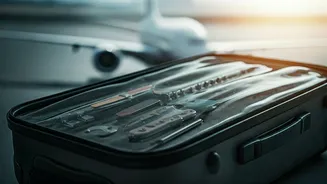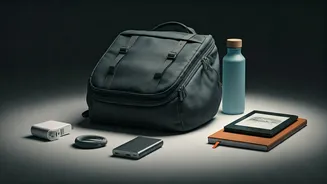Sharp Objects
One of the most obvious, yet frequently overlooked, items to avoid packing is any sharp object. This includes knives (even small ones), scissors, and box
cutters. These items are generally prohibited in carry-on luggage due to their potential to cause harm. While some may be permitted in checked baggage, it's always best to err on the side of caution. Consider the type of trip and activity planned and if unsure, it is best to leave them behind. Furthermore, it is important to be aware of the specific regulations of the airline and destination country, which can vary. If you are a frequent traveler, it might be beneficial to invest in travel-sized versions or simply acquire such items at your destination. This can prevent unnecessary delays or confiscations at the airport. Moreover, keep in mind that the definition of a 'sharp object' can be subjective, so when in doubt, it is best to not bring them.
Flammable Substances
Another crucial category of items to avoid includes flammable substances. These substances pose a significant safety risk during air travel. This encompasses items such as lighter fluid, matches, and certain types of aerosols. These materials are highly combustible and can create fire hazards in the confined space of an aircraft. Regulations regarding flammable items are strict, and violations can result in serious penalties. It's important to thoroughly check all your belongings for these items before heading to the airport. This includes toiletries, as some hairsprays and deodorants can be flammable. When packing liquids and aerosols, ensure they are in containers that meet the size restrictions set by the Transportation Security Administration (TSA), and place them in a clear, resealable bag. Being vigilant about flammable items contributes greatly to a safe and hassle-free travel experience. This also extends to electronic devices with lithium batteries, as those are subject to strict rules to prevent them from overheating.
Weapons and Firearms
It should go without saying, but weapons and firearms are strictly prohibited in carry-on luggage and are subject to rigorous regulations if transported in checked baggage. This encompasses all types of firearms, ammunition, and other dangerous weapons. Any attempt to bring such items onto a flight could lead to severe legal consequences, including arrest and prosecution. If you must travel with a firearm for legitimate reasons (such as a sporting event), you are required to declare it to the airline and follow specific protocols. This typically includes storing the firearm in a locked, hard-sided case and checking it as baggage. Always familiarize yourself with the regulations of both the departure and arrival locations to ensure compliance. Remember, the safety of all passengers is the utmost priority. As a result, any items that can be used as weapons are closely monitored at every stage of the travel process.
Explosive Materials
Similar to flammable substances, explosive materials are absolutely forbidden on flights. This includes items such as fireworks, dynamite, and any other substance designed to explode. These materials pose an extreme risk during air travel. Even seemingly harmless items can be classified as explosive if they contain certain ingredients or are capable of igniting. Attempting to bring such items onto a plane can lead to severe penalties, including hefty fines and possible jail time. Always check your luggage carefully to avoid inadvertently packing any prohibited materials. If you're unsure about the status of an item, it's always better to err on the side of caution and leave it behind. Contacting the airline or TSA beforehand can help clarify regulations and ensure a smooth experience. Safety is always paramount when it comes to air travel, and everyone needs to do their part to ensure a secure flight.
Blunt Instruments
Besides sharp objects, blunt instruments are also restricted. Items like baseball bats, golf clubs, and even certain types of tools can be considered dangerous. The main concern with these items is their potential to be used as weapons. Therefore, they are often prohibited in carry-on luggage. While some of these items may be allowed in checked baggage, it's best to check with the airline beforehand. This will prevent any last-minute surprises at the security checkpoint. For sporting equipment, consider the size and the possibility of disassembly. Always make sure to secure any potentially dangerous items properly. It will allow a safer travel experience for everyone. Be mindful of the context and reason for travel. In many cases, it's safer to acquire such items at your destination. This avoids any possible issues with baggage restrictions.
Lithium Batteries (Excess)
Lithium batteries power many devices, but there are regulations surrounding their transport on flights. While items like cellphones and laptops with built-in lithium batteries are usually permitted, there are limitations on spare batteries. Spare lithium-ion batteries are often limited to a certain watt-hour rating, and generally require being carried in carry-on luggage. This allows for easier monitoring and management in case of a problem. Larger lithium-ion batteries, often found in power tools or e-bikes, may have specific restrictions and may need to be transported as cargo. The key is to check the specific regulations based on the battery's watt-hour rating. Always ensure that spare batteries are protected from short circuits by placing them in individual protective cases. These batteries should be carefully packed to prevent any accidental activation or damage during the flight. It’s always best to be aware of the regulations to ensure a smooth and safe journey.
Food Items (Certain)
Certain food items are restricted from being brought on flights. This is partly due to regulations regarding liquids and gels, but also due to potential spoilage issues and pest control. Liquid or gel-like food items, exceeding the prescribed size limits, are restricted in carry-on baggage. This includes items such as jams, honey, and sauces. Foods with strong odors can also be a cause of concern, especially on long flights. Therefore, it's advisable to avoid packing pungent food items. Consider your destination and its customs regulations as well. There might be restrictions on bringing in certain agricultural products. It's always wise to research the specific restrictions of your destination country. This way you can avoid issues with customs officials. For longer flights, it’s best to purchase food items after passing through security. This ensures the items comply with all regulations.
Over-the-Counter Medications
While over-the-counter medications are generally allowed on flights, there are specific considerations. Liquids, gels, and aerosols are subject to the same restrictions as other liquids and gels. This means that if the medication is in liquid form, it must comply with the standard size limits. Always bring medications in their original packaging. This provides clear identification and any required instructions for use. It is also good to have a prescription available, even for over-the-counter medications, as proof of their necessity. Pack any essential medications in your carry-on luggage, so you will have immediate access to them. It is important to check the regulations of your destination country as well, since medication rules vary. This can help prevent any potential delays or complications at security checkpoints. Being prepared is the key to a stress-free travel experience.












